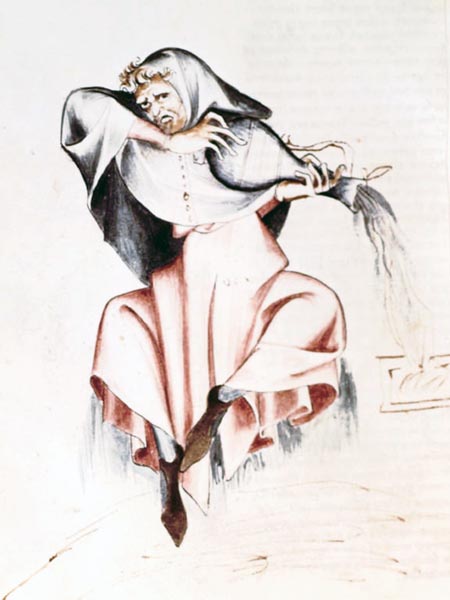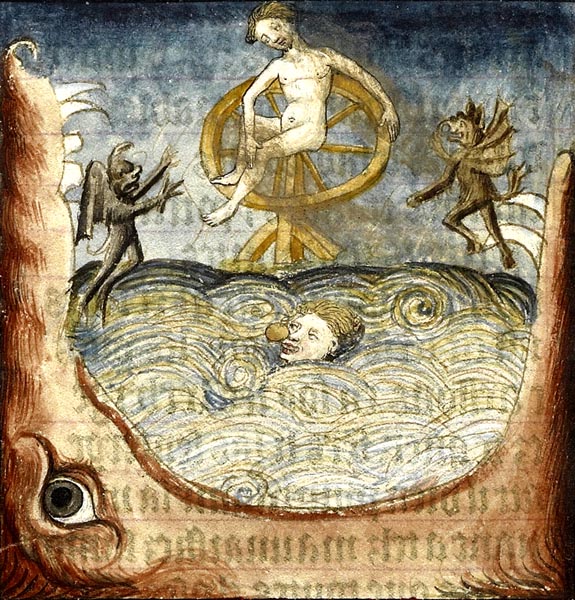Horace: The Satires
Book I: Satire I
Translated by A. S. Kline © Copyright 2005 All Rights Reserved
This work may be freely reproduced, stored and transmitted, electronically or otherwise, for any non-commercial purpose. Conditions and Exceptions apply.
Contents
- BkISatI:1-22 Everyone is discontented with their lot
- BkISatI:23-60 All work to make themselves rich, but why?
- BkISatI:61-91 The miseries of the wealthy
- BkISatI:92-121 Set a limit to your desire for riches
BkISatI:1-22 Everyone is discontented with their lot
How come, Maecenas, no one alive’s ever content
With the lot he chose or the one fate threw in his way,
But praises those who pursue some alternative track?
‘O fortunate tradesman!’ the ageing soldier cries
Body shattered by harsh service, bowed by the years.
The merchant however, ship tossed by a southern gale,
Says: ‘Soldiering’s better. And why? You charge and then:
It’s a quick death in a moment, or a joyful victory won.’
When a client knocks hard on his door before cockcrow
The adept in justice and law praises the farmer’s life,
While he, going bail and having been dragged up to town
From the country, proclaims only town-dwellers happy.
Quoting all the other numerous examples would tire
Even that windbag Fabius. So to avoid delaying you,
Here’s what I’m getting at. If some god said: ‘Here I am!
Now I’ll perform whatever you wish: you be a merchant
Who but now was a soldier: you the lawyer become a farmer:
You change roles with him, he with you, and depart. Well!
What are you waiting for? They’d refuse, on the verge of bliss.
What in reason would stop Jove rightly swelling his cheeks
Then, in anger, and declaring that never again will he
Be so obliging as to attend to their prayers.
BkISatI:23-60 All work to make themselves rich, but why?
Then again, not to pass over the matter with a smile
Like some wit - though what stops one telling the truth
While smiling, as teachers often give children biscuits
To try and tempt them to learn their alphabet? -
No: joking aside, let’s turn to more serious thoughts:
The farmer turning the heavy clay with sturdy plough,
The rascally shopkeeper, the soldier, the sailor
Who boldly sails the seas, all say they only do so
So as to retire in true idleness when they are old,
Having made a pile: just as their exemplar
The tiny labouring ant drags all she can together,
Adding what’s in her mouth to the heap she’s building,
Neither ignorant of nor careless of her tomorrow.
Though as soon as Aquarius freezes the turning year,
Wise creature that she is, she no longer forages,
Using instead what she gathered, while nothing stops you,
Nothing deflects you from riches, not scorching heat, fire
Winter, sword or sea, while there’s a man richer than you.
Yet what good is all that mass of silver and gold to you,
If, fearful, you bury it secretly in some hole in the ground?
‘If I broke into it,’ you say, ‘ it would all be gone, to the last
Brass farthing.’ Yet if you don’t what’s the point of your pile?
Though you’ve threshed a hundred thousand measures of corn
That won’t make your stomach hold any more than mine:
Just like the chain-gang where carrying the heavy bread-bag
Over your shoulder won’t gain you more than the slave
Who lifts nothing. Tell me then, what difference to the man
Who lives within Nature’s bounds, whether he ploughs a hundred
Acre s or a thousand? ‘But it’s sweet to take from a big heap.’
Even so why praise your granaries more than our bins,
So long as we’re able to draw as much from the smaller?
It’s as if though you needed no more than a jug of water,
Or a single cup, you said: ‘I’d rather have the same amount
From some vast river rather than this little spring.’ That’s why
Raging Aufidus sweeps away riverbanks, and all those
Who delight in owning more than their fair share of wealth.
But the man who desires only as much as he needs,
Won’t drink muddy water, or lose his life in the flood.

‘Aquarius’
Treatise on Astrology - Albumazar (Netherlands, 14th century)
The British Library
BkISatI:61-91 The miseries of the wealthy
Still, a good many people misled by foolish desire
Say: ‘There’s never enough, you’re only what you own.’
What can one say to that? Let such people be wretched,
Since that’s what they wish: like the rich Athenian miser
Who used to hold the voice of the crowd in contempt:
‘They hiss at me, that crew, but once I’m home I applaud
Myself, as I contemplate all the riches in my chests.’
Tantalus, thirsty, strains towards water that flees his lips –
Why do you mock him? Alter a name and the same tale
Is told of you: covetously sleeping on money-bags
Piled around, forced to protect them like sacred objects,
And take pleasure in them as if they were only paintings.
Don’t you know the value of money, what end it serves?
Buy bread with it, cabbages, a pint of wine: all the rest,
Things where denying them us harms our essential nature.
Does it give you pleasure to lie awake half dead of fright,
Terrified night and day of thieves or fire or slaves who rob
You of what you have, and run away? I’d always wish
To be poorest of the poor when it comes to such blessings.
‘But,’ you say, ‘when your body’s attacked by a feverish chill
Or some other accident’s confined you to your bed,
I’d have someone to sit by me, prepare my medicine
Call in the doctor to revive me, restore me to kith and kin.’
Oh, but your wife doesn’t want you well, nor your son: all
Hate you, your friends and neighbours, girls and boys.
Yet you wonder, setting money before all else,
That no-one offers you the love you’ve failed to earn!
While if you tried to win and keep the love of those kin
Nature gave you without any trouble on your part,
Your effort would be as wasted as trying to train
A donkey to trot to the rein round the Plain of Mars.

‘Tantalus and Ixion Suffering Torment in the Underworld’
Anonymous (France, c. 1405)
The Getty | Open Content Program
BkISatI:92-121 Set a limit to your desire for riches
So set a limit to greed, and as you gain more
Fear poverty less, achieving what you desired,
Make an end of your labour, lest you do as did
One Ummidius. It’s not a long tale: he was rich,
So much so he was forced to weigh his coins: so stingy
He dressed no better than a slave: and right to the end
He was fearful lest starvation overcome him.
Instead a freedwoman cut him in two with an axe,
She an indomitable scion of Tyndareus’ race!
‘Do you want me to live, then,’ you say, ‘like Naevius
Or Nomentanus?’ Now you’re setting up a war
Of opposites. When I order you not to be avaricious
I’m not telling you to become an idle spendthrift.
Between Visellius’ father-in-law and Tanais
There’s a mean. Measure in everything: in short, there are
Certain boundaries, on neither side of which lies Right.
I return to the point I first made, that no one’s content
In himself, because of greed, but envies all others
Who follow different paths, pines that his neighbour’s goat
Has fuller udders, and instead of comparing himself
With the poorer majority, tries to outdo this man and that.
But however he hurries there’s always one richer in front,
As when the galloping hooves whisk the chariots away
From the gate, the charioteer chasing the vanishing teams,
Indifferent to the stragglers he’s leaving behind.
So we can rarely find a man who claims to have lived
A happy life, who when his time is done is content
To go, like a guest at the banquet who is well sated.
That will do. Lest you think I’ve pillaged the shelves
Of bleary-eyed Crispinus, I’ll add not a single word.
End of Book I Satire I